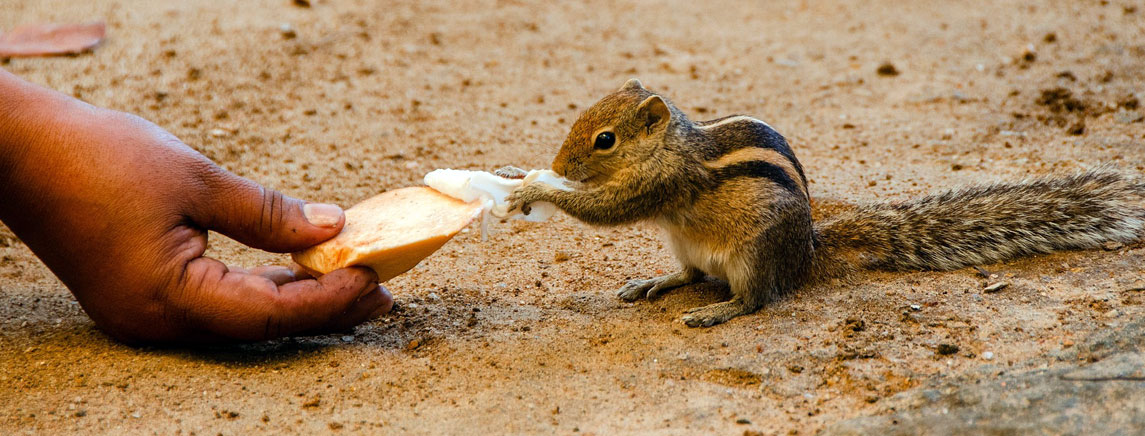A wildlife feeding ban has been introduced by the City of Toronto as of April 1, 2023.
Recently, there have been numerous reports of wildlife coming in close contact with residences and businesses. As a result, city officials are taking steps to ensure the safety of residents and visitors to Toronto. The simple act of feeding ducks, birds, squirrels, and small wildlife might seem harmless, but it encourages dangerous human-to-animal confrontations.
The amendment to the city’s Animal Bylaw under Chapter 349 prohibits feeding wild animals or leaving food out to attract animals on all private and public properties, beginning April 1st. It should be noted that these new rules do not apply to private property owners who feed songbirds as long as the bird feeders are kept above grade, in a sanitary condition, and do not attract other wildlife.
Why Was the New Regulation Introduced?
This new regulation is another step of the wild animal control law to protect both people and animals while providing a safe environment within the city.
With the increase of construction and urban sprawl, more animal habitats are being displaced or destroyed. Essentially the homeless animals must then search for shelter, food, and water near their old habitats, which have now become city dwellings. This has created a series of adverse interactions with wildlife by pets, children, and even adults.
Aside from the regular visitors of birds, squirrels, mice, and raccoons, more neighborhoods are seeing frequent sightings of foxes, coyotes, deer, and even bears. All wildlife can create unsanitary conditions and pose a risk for diseases wherever they settle.
In addition to thwarting the physical and health risks wildlife poses to humans, the new bylaw is designed to protect the local ecosystem and the natural behavior of the wildlife. Regular feeding by human contact can have detrimental consequences on wildlife as they become dependent on artificial food sources. It can also encourage wildlife to no longer fear humans and it prevents them from learning how to source their own food.
What Does the New Regulation Entail?
The ban on feeding wild animals prohibits the feeding on public and private properties, bans leaving food out to attract wildlife, and allows officials to impose fines for violations.
This new regulation provides information on how feeding wild animals can harm them. If the city receives concerns or complaints about a potential violation, a bylaw enforcement officer will investigate, provide education to the person(s) involved, and/or take enforcement action. All concerned citizens can call 311 to report incidents or potential violations.
The new Toronto bylaw amendment has not yet been assigned a list of fines but the previous wildlife feeding bylaw fines started at $365.
Toronto is not the only Ontario city addressing incidents of wildlife feeding. In Mississauga, the maximum fine for feeding wild animals is $5,000, while the city of Hamilton has related fines ranging from $10,000 to $25,000. There are several other towns and cities in Ontario that also address the issue of the feeding of wildlife.
What Happens If You Continue to Feed Wildlife?
In Toronto, as feeding wild animals is illegal, not to mention dangerous for both humans and animals, fines and court action could be pursued by city officials. These actions include using food to attract wildlife for entertainment purposes and for disposing of garbage in an unproper manner.
It is a well-proven fact that food and water sources can draw wildlife to gather in numbers, increasing the risk of diseases and damage to property and the natural habitats. Allowing animals to remain within the city limits can see motor vehicle accidents occur, injuring both pedestrians, vehicle occupants, and the animals.
The City of Toronto’s Views on Feeding Wildlife
Dr. Esther Attard is the City of Toronto’s Chief Veterinarian. In a recent interview with CP24 News, she discussed the new wildlife feeding ban.
It may seem harmless to feed small animals in parks or conservation areas, but providing food to any kind of wildlife can be dangerous, she explains. For example, leaving food out for squirrels can also attract foxes or coyotes, which are much more of a public safety issue than just feeding a squirrel.
She acknowledges that people want to connect with wildlife and often think that feeding wildlife is a nice gesture, but it can impact animals negatively. Not all human food is good for animals. Ultimately, the city’s goal is for people to not feed animals, but instead view them from afar.
“Let them figure out what it is that they need to eat,” says Attard. “Keep your garbage well secured so that animals aren't attracted unintentionally to your home and to an area where there are a lot of people.”
Contact Hawkeye Bird & Animal Control for Wildlife Removal in Toronto
If you require help with wildlife removal in your Toronto neighborhood, call Hawkeye Bird & Animal Control. We are the only pest bird and animal/wildlife control company in Canada designated "Certified Wildlife Control Professional" AND hold the following licenses: Trapping of Fur Bearing Animals Permit, Falconry Permit, and Pest Control License. This allows us to employ control methods in addition to relocation of captured raccoons.
We advise all residential and commercial properties to secure their garbage and structures to eliminate available food and water sources for wild animals. With our help, homeowners and businesses can reduce the risk of property damage and hazardous situations. Call us today at (416) 429-5393 or fill out our form here














